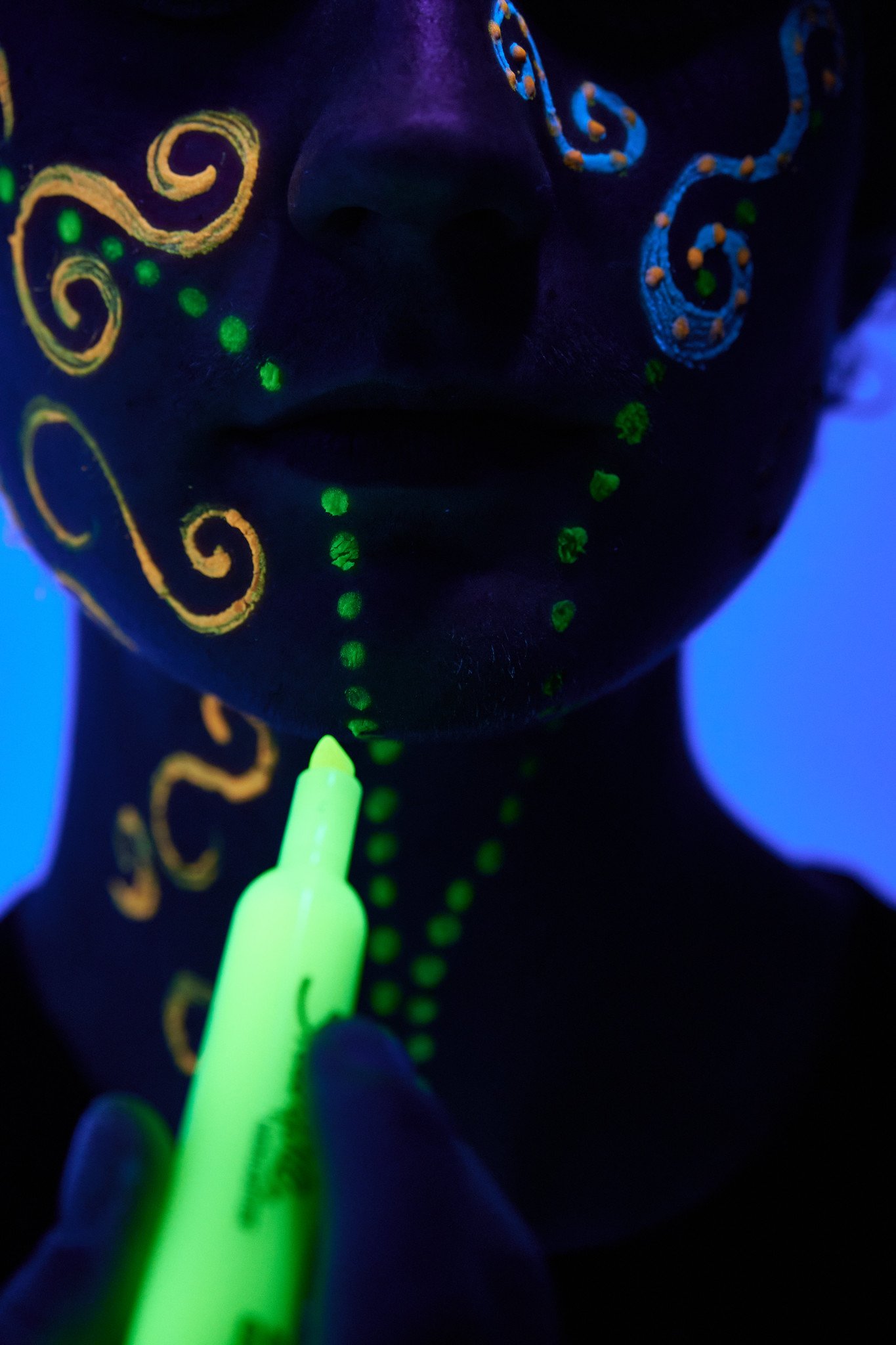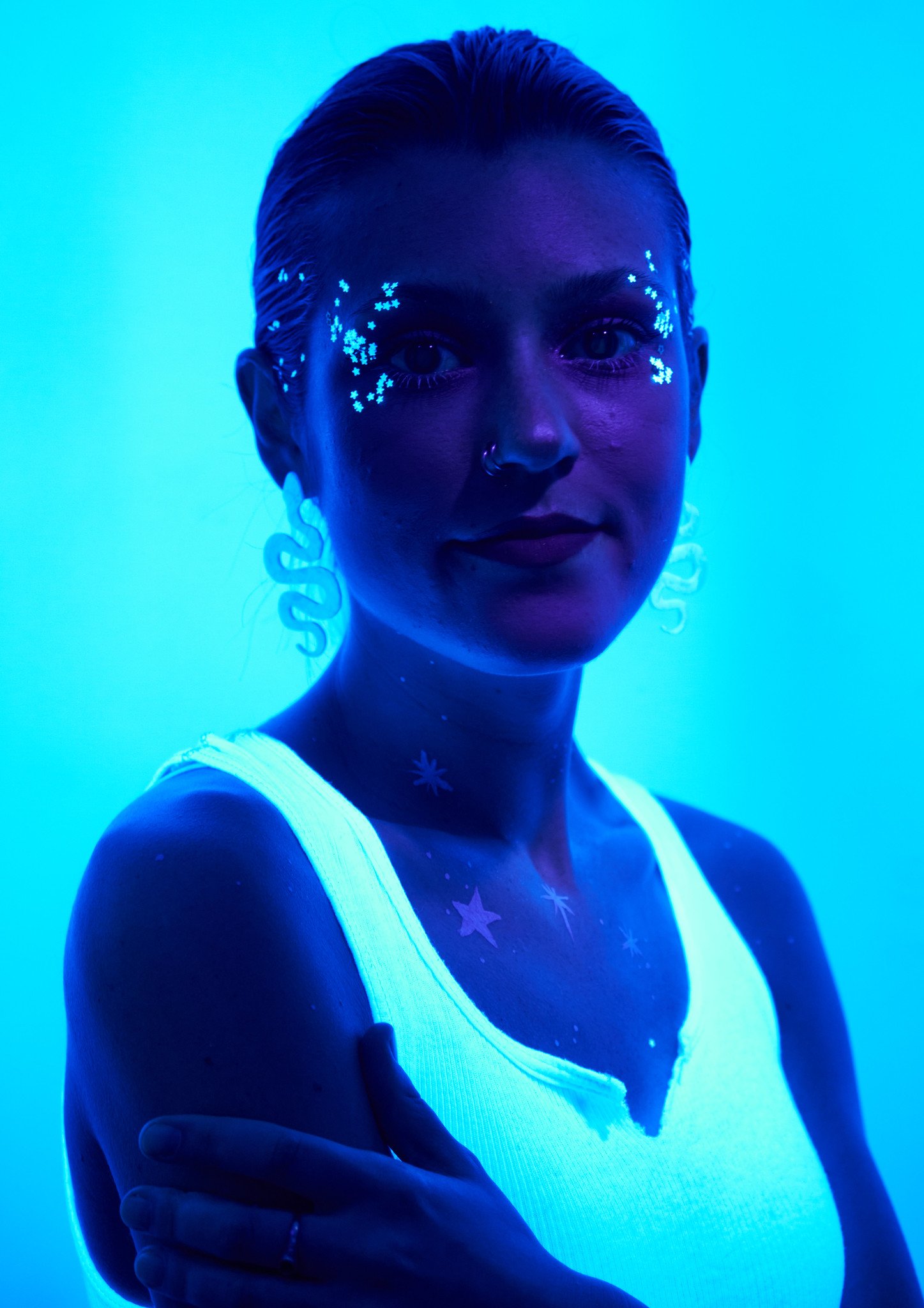I think most people have a fascination of the effects of black lights, being exposed to their color twisting effects in places like bowling alleys, laser tag, and arcades. Like most people, I found it interesting how certain colors would just pop and seemingly glow. I’d seen a couple photographs over the years showcasing these effects, but none of them were interesting enough to truly peak my interest to try it myself.
Since I was taking a couple photography related classes for my college degree, I pushed myself to try some techniques I hadn’t done before, one of which ended up being portraits under black light. I knew I wanted bright and colorful makeup that would hopefully pop like I’d seen in bowling alleys, so I reached out to a couple people who were makeup artists. I rushed over to the local WalMart to pick up some black lights after a little bit of research, and was ready to go within a few hours.
I set up the black lights as best as I could, and had a makeup artist by the name Bella come over with a friend of hers to try out a couple different looks and get some hopefully great photos. Bella brought some of her most colorful palettes of makeup, and worked on applying them. I then began the lofty task of blocking out all of the light from my entire apartment, to get the best possible chance of capturing the glow from the black lights. I hung blankets across every window, closed doors where I could, and closed the blinds as best as I could at 2pm on a Saturday. For the most part, it worked pretty well, but there was still a tiny bit of light creeping in. That would end up being the least of my worries.
Once we got started shooting, we quickly realized that the black lights weren’t doing what we thought they would do. Vibrant greens and blues were turning grey, somehow being washed out instead of lifted by the lights. We scrapped our original plans and ended up using a little bit of a fill light to not completely put the look Bella had created to waste. The photos turned out okay for the first look, but the green being washed out by the black lights really put a damper on things.
The fill light definitely helped to bring back some color in the makeup, but overall the look ended up not working out. We turned off the fill light, and put Bella’s makeup palette right next to the lights, discovering that basically all of them turned to grey under its effects. We were at a loss. After talking it over a bit, we decided to try some different paint I had (not very skin safe, but it did end up working somewhat decently.)
The orange paint I had laying around certainly popped more than the green eye shadow did, but its effects were still pretty minimal. The shimmer glitter on the eyebrows popped incredibly, though I’m not sure if they were glowing because of the black lights, or just reflecting the light from them towards the camera. None the less, it seems to be working better, so we were happy with the results. We ended up doing one more look, with slightly more orange paint, and it ended up just being more of the same.
At this point, we felt defeated with the entire attempt, being thwarted by the lights and the little effect they had on the makeup. Bella and her friend left, and I went to figure out why the hell it hadn’t worked the way we thought it would. After doing a bit of research, I came to discover that there were multiple different types of black lights, determined by the nanometer wavelength they had.
The lights I bought were 395nm black lights, which is on the absolute edge of the UVA spectrum before they are no longer considered black lights. Around 400nm, the light will emit a violet hue, which mine very obviously do. A true black light will emit no visible light, which is around 365nm and below. 365nm seems to be the industry standard when it comes to true black lights, as they create the most visible pop of color that we associate with them.
Many companies will market lights as black lights, when it reality they are simply violet lights, and have very little resemblance to actual black lights in effect. If you’re looking to buy some, find ones that say they are around 365nm in the light spectrum, otherwise you’ll encounter similar results to what I did. They are typically more expensive, but in this case, I think you’re getting a better product and the actual product that you’re looking for. Knowing what I knew now, I scheduled another photoshoot with a girl in my class by the name of Liv, and told her what did and did not ultimately work so we would have a more successful shoot.
After learning from all the previous issues, my shoot with Liv was going amazingly. The star glitter glowed around her eyes perfectly, and the white glow from her top looked incredible. The blue light wrapped around her and lit up my paper roll behind and gave the photos a somewhat otherworldly feel to them. While the top, glitter, and earrings did glow very nicely, the white paint she had used only showed a slight glow, showcasing the issues I had with the first go around in my black light portrait attempts.
I’m still not sure if the glitter was actually glowing or reflecting from the black lights, but they do look the way I originally imagined they would. We did a couple more photos and applied some of the stars and glitter to me, and enjoyed the success of my second attempt at the shoot.
Overall, shooting portraits with black lights was incredibly fun, but also incredibly challenging as I didn’t quite understand how they worked going into it originally. I would love to continue shooting portraits like this, but would need to invest in a true black light with a 365nm wavelength to get the effects I was originally aiming for and imagining. Feel free to buy me this one from Amazon, as I think it would really help me explore this niche area even further and get better results overall.
I highly recommend explore this niche too if it interests you, but please learn from my mistakes (or don’t) and avoid the downfalls of misleading advertising and barely black light black lights.







